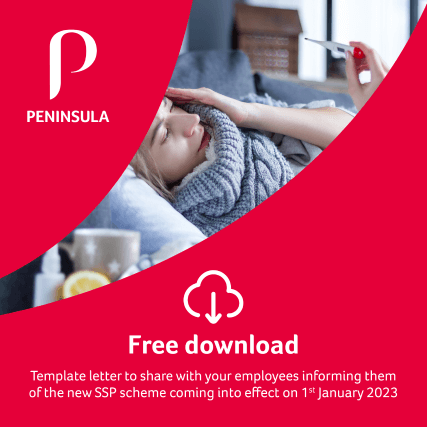What is the Statutory Sick Pay scheme
The Statutory Sick Pay scheme aims to provide a minimum level of protection to low-paid employees who have no access to an employer’s sick pay scheme. It does, however, also apply to all employees, and it’ll have a major impact on employers, too.
January 2023
SSP to come into effect on 1 January 2023.
How will the statutory sick pay (SSP) scheme in Ireland affect your business?
How Peninsula will help
When it comes to ensuring your business meets Statutory Sick Pay requirements, Peninsula can help you update your essential employment documentation, including contracts, policies, and employee handbooks. And should an issue ever arise between your business and an employee, expert advice is only a call away.
When it comes to ensuring your business meets Statutory Sick Pay requirements, Peninsula can help you update your essential employment documentation, including contracts, policies, and employee handbooks. And should an issue ever arise between your business and an employee, expert advice is only a call away.
Get instant support now
Get in touch with Peninsula today to discuss the SSP scheme.
Key points
Frequently asked questions
What obligations does the scheme place on employers?
With the introduction of the sick pay scheme in Ireland, you have a statutory obligation to pay employees who become sick and are absent from work as a result.
As an employer, you’re obliged to keep accurate records for each employee. These records must be maintained for four years and include information in relation to each employee who availed of sick leave.
The below information must be recorded in the records:
- The employee’s period of employment.
- The dates of statutory sick leave in respect of each employee.
- The rate of statutory sick leave payment in relation to each employee.
Failure to maintain accurate records may lead to a conviction and to a fine of up to €2,500.
What can employers do to prepare?
If you already provide a sick pay scheme, you’ll need to review and consider the scheme under the new legislation. If the sick pay scheme in place meets or is more favourable than the statutory provisions, your obligations have been satisfied. If the current sick leave policy is less favourable, it will need to be modified.
The scheme sets out the criteria for you to determine whether your existing sick pay scheme is more favourable than the statutory provisions provided:
- The period of service of an employee required before sick leave is payable.
- The number of days an employee is absent before sick leave is payable.
- The period for which sick leave is payable.
- The amount of sick leave that is payable.
- The reference period of the sick leave in Ireland scheme.
If you don’t already provide sick pay, the scheme will likely result in additional costs for your business. It's important to review any existing sick pay schemes to check whether the new rules will affect you in the first place. You should also review your employment contracts.
What businesses are exempt?
Employers who genuinely cannot afford SSP can apply to the Labour Court for an exemption from the scheme. Such an exemption can apply to the employer from between three months to a year.
The Labour Court will look for an agreement between the employer and their employees consenting to the exemption. Failing this, the Labour Court may still grant an exemption if satisfied that the employer has informed its employees of its financial difficulties and attempted to reach an agreement. An exemption may also be granted if the employer was compelled to pay SSP, leading to the viability of the business being adversely affected, or likely leading to a material number of employees being laid-off or made redundant.
Which of my employees can claim SSP?
To be eligible to claim SSP, employees must meet key criteria:
- They must have been employed by the business for a minimum of 13 weeks of continuous service.
- They must provide a GP certificate, confirming they’re unfit for work and indicating their expected return date.
- The leave must be in relation to a day or days when an employee would ordinarily work but is incapable of working due to illness or injury.
- The leave can be taken on consecutive days or non-consecutive days.
The scheme does, however, provide increased protections for employees. An employee who is on statutory sick leave is required to be treated as if they have not been absent. Any time spent on statutory sick leave should not affect any rights in relation to the employee’s employment. The scheme also protects an employee against being penalised for exercising or proposing to exercise their statutory sick leave entitlement.
This means that there will be an obligation on employers to ensure that employees are not being treated differently for taking statutory sick leave. This obligation is similar to that placed on employers when employees are on maternity leave, paternity leave, etc.
